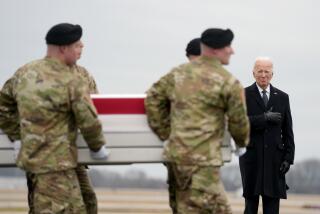Tragic Tests of U.S. Resolve
Around office water coolers and on buses, Americans are questioning the U.S. occupation of Iraq. Less than five months after troops toppled Saddam Hussein’s statue in the heart of Baghdad, the grumbling grows louder. President Bush needs to remind Americans that the United States, having invaded Iraq and ousted Hussein, is obliged to repair the damage and help the Iraqis rebuild; he should explain in detail how many years the job will take and how many tens of billions of dollars it will cost.
Tuesday’s suicide bombing of United Nations headquarters in Baghdad, the horrific low point in a terrible week, underlines the reason why 140,000 U.S. troops are in Iraq. It also argues for extra military and financial help from other countries. The explosion killed more than a dozen people, including Sergio Vieira de Mello, the top U.N. diplomat in Iraq and a Brazilian of high skill and great experience. In July, De Mello told the U.N. Security Council that the effect of violence in Iraq “must not be underestimated.” He said killings of soldiers, police and foreign civilians threatened to “shake the resolve” of Iraqis to rebuild their country.
Near daily attacks on U.S. soldiers also threaten the resolve of Americans, while disruption of electrical power and other vital supplies makes life miserable for Iraqis. In the last week, guerrillas bombed an Iraqi oil pipeline only two days after it resumed operations; they also were blamed for rupturing a water main, cutting off water to thousands. A U.S. helicopter removed a religious banner, provoking protests that led to a shootout between Iraqis and occupation troops and forced an American apology.
The U.N. bombing was a classic terrorist attack, targeting not military forces sometimes perceived as colonizers but civilians trying to help Iraqis with food, supplies and schools. Determining who ordered and financed what Secretary of State Colin L. Powell called “a heinous crime” must be a top priority. Less than two weeks ago, a suicide bomber attacked the Jordanian Embassy in Baghdad, killing nearly 20 people. Failure to stop such attacks can attract more terrorists intent on driving foreigners out of Iraq and making the nation a launching pad for extremism.
Hussein’s ouster benefited Iraq, but a failure to stabilize the country could leave Iraqis worse off than they were under his dictatorial rule. The Security Council and Bush appropriately vowed not to be driven from the country, but the U.S. bears the burden of fixing shaky security. Cooler weather in the weeks ahead will make it easier to plow fields, build schools and dig wells, but foreign aid workers and Iraqis cooperating with Americans need protection before they can do their jobs. The last week demonstrates how much Iraqis, the U.N. and the U.S. depend on each other; they require a unified front against terrorism and more forces to fight it.
More to Read
Sign up for Essential California
The most important California stories and recommendations in your inbox every morning.
You may occasionally receive promotional content from the Los Angeles Times.










